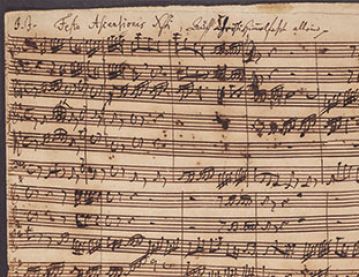The Bodleian Libraries have announced the acquisition of the autograph of Johann Sebastian Bach’s cantata for Ascension Day: ‘Auf Christi Himmelfahrt allein’ (BWV 128).
The manuscript, which is one of only four in the UK in the hand of the great composer, has been accepted in lieu of inheritance tax by HM Government and allocated to the Bodleian. It will go on public display from 15 March 2024 as part of the free exhibition Write, Cut, Rewrite, which is open until 5 January 2025 in the Weston Library’s Treasury.

The autograph, also known as ‘the Kohn manuscript’, after the great collector Ralph Kohn, is a magnificent example of a composing draft and sheds light on one of Bach’s finest cantatas. The document has been exceptionally well cared for and the erosion of paper is mostly limited to the edges, making this one of the best-preserved autographs of Johann Sebastian Bach.
Bach is one of the greatest Western composers of all time. His compositions represent a watershed in music history: the sum of all that came before him and an example and inspiration to all those who followed. Despite his prolific production, very few of Bach’s works were published in his lifetime, and without the miraculous survival of his autograph manuscripts in institutional collections, most of his masterpieces would be lost.
Saved for the public to admire and enjoy
The manuscript was last owned by Leipzig-born Sir Ralph Kohn, who left Germany as a child and sought shelter in Britain, where he became a successful medical scientist and businessman. Sir Ralph was a great lover of music and owned many other manuscripts, but this Bach cantata was the pinnacle of his collecting. Out of love for his adopted home, he wanted the precious document to go to a UK institution, and this wish was later fulfilled by his descendants with this donation.
Richard Ovenden OBE, Bodley’s Librarian, said: ‘The Bodleian has collected music in a serious way since its foundation over 400 years ago, but a significant manuscript in the hand of one of the greatest composers of all time, Johann Sebastian Bach, has eluded us, until now. We are hugely grateful to the Acceptance in Lieu Panel, and to the estate of Zahava Kohn.
‘We are thrilled to be entrusted with this global treasure, collected by the late Ralph Kohn, who fled his native Leipzig to avoid the Nazis, but who never lost his love for the city’s greatest music genius. We look forward to sharing this sublime treasure with scholars, engaging with music students and inspiring composers long into the future.’
Commemorating the tercentenary
‘Auf Christi Himmelfahrt allein’ was composed for the feast of the Ascension, 10 May 1725. The short, festive cantata, which lasts less than 20 minutes in performance, is scored for two horns, three different types of oboe, trumpet, strings and continuo, with four-part chorus, and alto, tenor and bass soloists. Its five movements comprise a celebratory opening chorus, a short recitative and aria for bass voice, a duet for alto and tenor, ending with a simple chorale.
The autograph will join the already rich music archive of the Bodleian’s special collections. It will also be digitised and made available through the library’s platform for sharing its digitised collections, Digital Bodleian, and through the Bach Digital online portal. A performance, commemorating the tercentenary of its original performance in 1725, is being planned.
Lord Parkinson of Whitley Bay, Minister for Arts and Heritage, said: ‘I’m delighted that this magnificent and important score can be shared with scholars and the public – both in person and digitally – thanks to the Bodleian Library and the Acceptance in Lieu Scheme. Seeing how Johann Sebastian Bach set down his genius on the page will help to deepen our appreciation and understanding of the great composer, whose work continues to move people around the world three centuries after he wrote it.
‘When we mark the tercentenary of this beautiful cantata next year, we can do so in the happy knowledge that this important treasure has been saved for the public to admire and enjoy for generations to come.’
